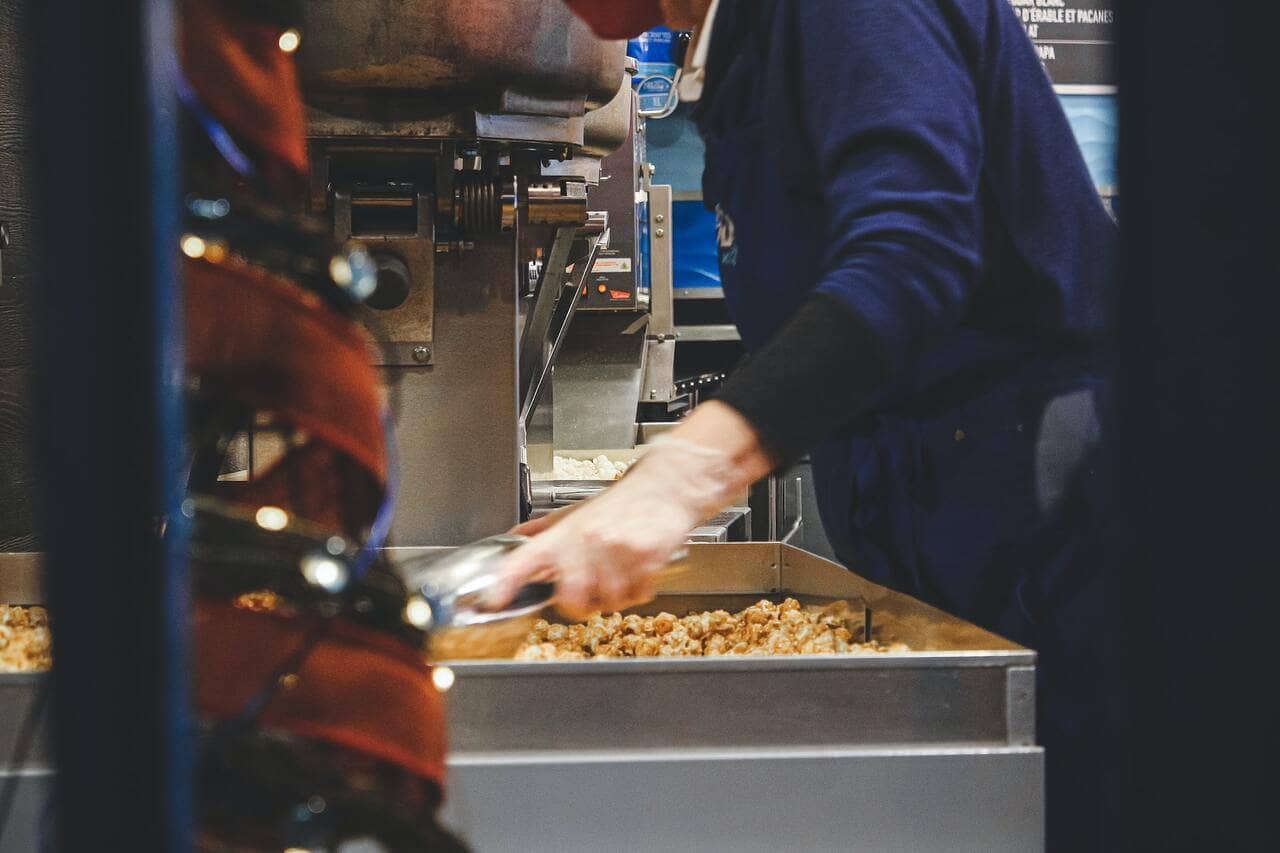If you have a sweet tooth and a passion for baking, a cookie business may be a great business opportunity for you to pursue. The global cookie market is over 40 billion US dollars. There is a huge market for cookies in the States and is expected to grow annually at an impressive rate.
It may be overwhelming to see the varieties of cookies in your neighborhood store. You may also feel that there is no room for a new player to enter the already established market. Companies such as Mondelez International have revenues of over 3.8 billion dollars (in the United States alone).
Fortunately, if you look at the US based sales of cookies from private label companies, it is a whopping 1.5 billion dollars. Thus even with incumbents being there in the market, you can make a mark of your own.
But how will you be able to get your cookie business idea out of the oven?
In this guide, we’ll help you navigate through the steps to formally set up your cookie business.
Read on to learn everything you need to know.
First thing that you will need to understand is that there is a big difference between baking for yourself and baking as a career. Your baked goods need to have a unique taste or a reason that will tempt a customer to buy from you, rather than the local competition or a nationalized brand.
If you have a story and a unique value proposition, it can help you gain a spot in the consideration set of a consumer. By doing extensive research, you will be able to find a niche in the cookie segment that you can capitalize on.
For example, after the COVID-19 pandemic, the consumers have become extra health conscious. There is a big trend of vegan, keto and gluten free products. Luckily, not every big brand has bandwidth to get into these niches.
But, you can definitely leverage the trend and start off as a healthy cookie company selling vegan and keto cookies. You can use organic non GMO ingredients and cater to a conscious consumer segment.
So as you can see, no matter how big the cookie market looks as a whole, you can always find a hole and fill it in with your products.
The following questions should help getting the thought process started:
- What will be your cookie company’s USP?
- Is there a local market for those cookies?
- What revenue potential can you see for those cookies?
- Will that revenue be worthwhile?
- Do you see a lot of competition in that segment?
Once you have an answer to these questions, you will have a much better idea of what your product offering will look like.
With this clarity of the product, you can now look at the business model for your cookie business.
When you start a cookie business, you will have multiple business models to choose from. Depending on what your preferences are, you can choose the one that suits you best.
Some of the models to consider:
Your own cookie brand
If you (or someone you can partner with) can bake your own cookies, sky's the limit for your cookie business idea. As long as you don't try to compete with the popular cookie manufacturers or aim to imitate their products, you can make a good business out of it.
The cookies will be sold under your own brand name and can be made available locally, nationally or globally. By choosing this option, you will implicitly choose to start from scratch and make cookies by sourcing flour, oils, chocolates, flavoring agents, equipment, packaging, etc.
The entire product cycle will be in your hands. You will have to make and distribute the cookies on your own.
Add cookies in your own store
In this model, you can add cookies to an existing and related store such as a bakery or restaurant. By adding cookies to an existing product offering, you can diversify and set your own cookie line under a theme or a brand.
The reason why you might want to have a separate branding is to have an opportunity to separate your cookie company from the primary brand at a later stage. If you put it under the same name as your primary store / company, the entire thing will be together and you won't be able to make a dedicated cookie business.
For example, Nestle makes a ton of products and also has a separate set of cookies such as Nestle’s Toll House cookies. The Toll House diversification from the parent company Nestle, gave them an opportunity to separate their business, which they did in 2022.
Own a franchise
You can opt to own a franchise store. This way you won't have to spend your efforts in food preparation and branding. The franchise option works well if you have money to invest, but don't want to go through the hassle of starting everything from scratch.
You will need to share the revenue and profits along with the franchise fee. But overall, being able to own a franchise of a well known brand can give you a very good return on investment.
Store in store or kiosks
With a smaller investment pool, you can also start your own kiosks and store in stores. The biggest advantage of this model is that you will be able to leverage other businesses’ foot traffic for your store sales.
You will need to share a certain percentage of your revenue, but overall it can help you set up your own cookie store with minimum investment.
Once you have tested the products using this approach, you can surely scale your business by opening your own standalone store.
Tip: If you would like to go with this option, you will need to find places where you can expect a lot of consumers who are passing by, like a mall, farmers market or a big box store.
Wholesaling other brand cookie products
If you have an expertise in business to business sales & marketing, this option is an amazing business opportunity. Although it may not be a standalone business, you can start with it and add product range gradually.
In this option you can become a cookie wholesaler and source cookies, biscuits and related products from all around the world. The retailers can then source the products from you and you can make a decent profit.
Contract manufacturing
Another business model that you can look at is contract manufacturing. You can set up your own manufacturing units and the big cookie brands can outsource manufacturing to you. This way, all of the branding, recipes, marketing and product ingredients will be taken care of by the brand and all that you will need to focus on will be manufacturing.
Any time spent on drafting your cookie business plan will be like an insurance towards the success of your cookie business. A business plan is the holy grail when you start your own business. It’s a step that will guide you and provide focus.
It will also show stakeholders such as investors and potential partners, about your vision and the direction your cookie business is heading.
Your business plan may not be a complex plan with every tiny bit of detail as you would need for a complex business idea. You can start small, have a draft business plan with basic outlines and then make changes as you scale your business.
Important things to consider in your business plan include:
Executive summary
The executive summary will first outline your business’s purpose and its current standing ( both financial and operational). It will also help give a better understanding of where you see your business in the next 3 - 5 years and why you think your business will succeed.
Business budget
A business budget will help you outline the financial requirements for your cookie business.
Basically you want to be clear with answers to questions such as what your costs will be and how you will make money? How long can you run your operations without having to look for more funding? Will your business generate enough profits to fund itself?
A few examples of the costs that you will incur and consider while starting a cookie business include:
- Equipment
- Initial investment in raw ingredients
- Staff salaries
- Rent
- Marketing
- Packaging
Market analysis
It is a no brainer that you are not the only one who can bake a cookie. Thus having a competition is expected and actually a good sign. Many strategists say that if you are starting a business where there is no competition, you need to be extra careful.
That said, market analysis will help you in many ways. Some of the questions that you should consider:
- Who else do your customers buy from?
- What is it that you need to do to attract customers your way?
- What is their pricing strategy?
- What cookie types are most popular in your target market?
- Can you sell your product nationally?
- Is there a market opportunity to sell your cookies online?
- How do the competition acquire customers?
- How do they talk to customers on social media?
- What variety sells the most?
With this information, you will have a much better idea of who else is out there and what they’re doing. It will also help you in identifying a saturated market in the beginning stages itself.
Once you have studied the market, have a business plan and are confident that there is a business opportunity that you can take advantage of, the next step is to get your cookie business formally registered and known to the appropriate authorities.
Here are a few things you need to know:
Selection of a business entity
For your cookie business, selection of a business entity structure is an important step but a confusing one. As this step affects tax, registration, licensing and funding, it is an extremely important step to complete.
It will depend on the business model you choose. For example, entity structure for a mall kiosk business model will be entirely different from the contract manufacturing model. If you are not registered correctly, a big brand may not want to partner with you.
You need to plan ahead and choose from the following options:
- A sole proprietorship: This type of business has one owner or is owned jointly by a couple. The taxes are reported on a personal income tax returns and overall the structure is very simple to begin, but difficult to scale and partner with big brands.
- Limited liability company (LLC): LLC gives all of its stakeholders a limited liability and personal protection in an unfortunate situation of a lawsuit of legal trouble. For taxation, there are multiple options to choose from.
- General partnership: It is sort of a sole proprietorship in terms of registration and taxes but has multiple owners ( partners).
- Corporation: Another type of incorporated business with options such as C-corp or S-corp.
Generally, in the beginning a sole proprietorship is an obvious choice and a popular legal entity structure. It is the simplest and easiest way to get started. You can transition to another entity structure as your business grows.
Tip: Consider consulting an attorney or a qualified professional for this step, as their experience will be extremely valuable. They will be able to help you with everything that you need to have to be compliant with everything.
Registration of your cookie business
You will need to make sure that your business is registered and follows all rules and regulations as set forth by the authorities. These rules vary from state to state. You can consider a quick visit to the local chamber of commerce and know about your obligations.
Additionally, depending on where you are located and the business model you decide, you may be legally required to obtain certain permits and licenses before you can start your own cookie business.
Registering a business name
As you already know, you will need a name for your business. Unfortunately, you can’t just choose any name you like. You will need to make sure that the name is not in use by any other person and is also not a trademark of other companies.
You can check the availability of the name by visiting the state website.
Tip: If affordable, hire a brand consultant to help you get creative and set you up for an outstanding business name.
If you decide to choose a business model where you will be baking your own cookies, you will need to invest in setting up baking infrastructure along with the raw ingredients. Else, if your business model involves sourcing cookies from another manufacturer, you can skip this step.
Some of the things that you will need, if you decide to go in retailing include:
Suppliers
You will surely need to do extensive research of suppliers for your cookie business needs. To make scrumptious cookies, you will need ingredients such as flour, butter, sugar, chocolate and other magic ingredients in your recipe. These are the things you will need to source from suppliers on a recurring basis.
When looking for a supplier, you should aim to find the ones that can supply on time and for the best price. You should not look for one off deals on these supplies and you would ideally want to build a relationship with suppliers and move on to running and scaling the business.
You should remember that in a business, you need to offer the best quality perceived at a specific price point. You can’t ( for all accounting reasons ) match the quality of ingredients of a bakery selling a $5 dollar cookie and sell it for under a dollar. Any such business will not sustain and would run into losses from earlier on.
So to keep your business’s financial health in check, look for suppliers that can give you the best deal possible (especially as you will be buying the supplies in bulk and on a frequent basis). Every penny saved in the input costs is one hundred percent profit.
Point of sale system
If you are deciding to open a bakery, cookie kiosk, shop-in-shop or any sales channel where customers will be giving orders in person, you will need to invest in a cash register. A POS is a modern version of a good old cash register. This is where your staff will be able to take orders and payments from customers.
There are many POS systems available in the market and you can do your research to select the one that is in your budget and meet your needs. With an advance in technology, there are accessories available, using which you can convert your phone into a mobile cash register for your store.
Buy or rent equipments
Before you can launch your business, you will need to procure ovens, dough makers, cookie cutters and other kitchen equipment. The cost for setting up goes in thousands of dollars and you should budget the expenses early on.
To keep it light on the pocket, you can consider renting them in the beginning. Once the business starts making money, you will always have an option to upgrade your equipment and buy them.
Tip: Don't make the mistake of buying all your equipment and supplies without testing your business in real life. These costs are sunk in costs and will hurt your cookie business profits.
Once you have launched your cookie business, you will start feeling a need for more funds to scale your business. As there is a limit to which you can extend your own savings, this is a time where you will need to look for external funding.
Worry not, this is the case with every other entrepreneur out there and your cookie business is no exception. Luckily there are a ton of options available for you to secure external funds.
We have listed a few options to consider:
- Friends and family
- Angel investor
- Venture capital
- Short term business loan
- Small business loan
- Credit card
By now, you have done everything that was in your control. For example, it is one hundred percent your decision to choose which business model you want to open, type of cookies you want to make etc.
But one thing that is not in your direct control is to get as many paying customers as you want. The reality is that just because your business is open and you think that you have the world's best cookies, it doesn’t guarantee any sales.
You need to tell customers that you are ready. You need to communicate with them and tell your story as to why they should buy from you?
This is where you need to work out a marketing plan. This is a step that will get paying customers for your business. The success of your cookie business will now depend on how well you can do marketing for your business.
Before you can start writing your marketing plan, you need to get some marketing fundamentals sorted out first. These are also called the four Ps of marketing: Product, Price, Promotion and Place.
After you have a clear understanding of the above fundamentals of marketing, you can start marketing your cookie business.
- Email marketing
- PPC marketing such as Google Ads, Facebook Ads
- Instagram marketing
- Tiktok marketing
- Traditional marketing
- SEO
- Local guides
- Online review platforms
Tip: Establishing your online presence and nurturing your customer base is one of the most important steps in growing your business.
Starting a cookie business takes as much dedication as any other business. Provided that you have passion and patience, you can make it a wonderful business. Given that startup costs are low, it is relatively easy to start small and build up over a period of time.
If you want to learn how to start a cookie business and grow it into a full time income, now is a perfect time to learn from the above steps and get started.
We wish you the best of luck and can’t wait to hear the stories of what you’ll build.




